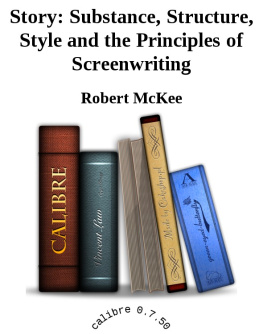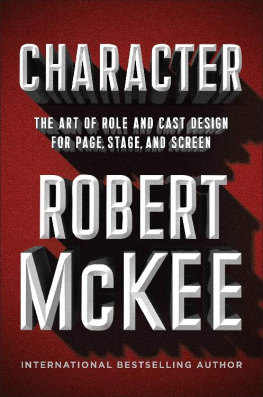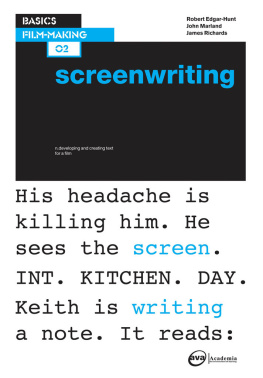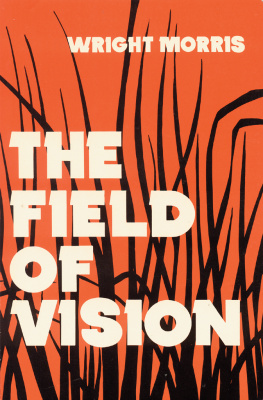Robert McKee - Story: Substance, Structure, Style and the Principles of Screenwriting
Here you can read online Robert McKee - Story: Substance, Structure, Style and the Principles of Screenwriting full text of the book (entire story) in english for free. Download pdf and epub, get meaning, cover and reviews about this ebook. year: 1998, genre: Romance novel. Description of the work, (preface) as well as reviews are available. Best literature library LitArk.com created for fans of good reading and offers a wide selection of genres:
Romance novel
Science fiction
Adventure
Detective
Science
History
Home and family
Prose
Art
Politics
Computer
Non-fiction
Religion
Business
Children
Humor
Choose a favorite category and find really read worthwhile books. Enjoy immersion in the world of imagination, feel the emotions of the characters or learn something new for yourself, make an fascinating discovery.
- Book:Story: Substance, Structure, Style and the Principles of Screenwriting
- Author:
- Genre:
- Year:1998
- Rating:5 / 5
- Favourites:Add to favourites
- Your mark:
- 100
- 1
- 2
- 3
- 4
- 5
Story: Substance, Structure, Style and the Principles of Screenwriting: summary, description and annotation
We offer to read an annotation, description, summary or preface (depends on what the author of the book "Story: Substance, Structure, Style and the Principles of Screenwriting" wrote himself). If you haven't found the necessary information about the book — write in the comments, we will try to find it.
Story: Substance, Structure, Style and the Principles of Screenwriting — read online for free the complete book (whole text) full work
Below is the text of the book, divided by pages. System saving the place of the last page read, allows you to conveniently read the book "Story: Substance, Structure, Style and the Principles of Screenwriting" online for free, without having to search again every time where you left off. Put a bookmark, and you can go to the page where you finished reading at any time.
Font size:
Interval:
Bookmark:
STORY
Substance, Structure, Style, and the Principles ofScreenwriting
ROBERT MCKEE
CONTENTS
:THE WRITER AND THE ART OF STORY
: THE ELEMENTS OF STORY
: THE PRINCIPLES OF STORY DESIGN
: THE WRITER AT WORK
PART I
THE WRITER AND THE ART OF STORY
Stories are equipment for living. Kenneth Burke
INTRODUCTION
Story is about principles, not rules.
Arule says, "You must do it this way." A principle says, "This works ... and has through all rememberedtime." The difference is crucial. Your work needn't be modeled after the"well-made" play; rather, it must be wellmade within the principles that shape our art. Anxious, inexperiencedwriters obey rules. Rebellious, unschooled writers break rules. Artists masterthe form.
Story is about eternal, universal forms, not formulas.
Allnotions of paradigms and foolproof story models for commercial success arenonsense. Despite trends, remakes, and sequels, when we survey the totality ofHollywood film, we find an astounding variety of story designs, but noprototype. DIE HARD is no more typical of Hollywood than are PARENTHOOD,POSTCARDS FROM THE EDGE, THE LION KING, THIS IS SPINAL TAP, REVERSAL OFFORTUNE, DANGEROUS LIAISONS, GROUNDHOG DAY, LEAVING LAS VEGAS, or thousands ofother excellent films in dozens of genres and subgenres from farce to tragedy.
Story urges the creation of works that will exciteaudiences on the six continents and live in revival for decades. No one needsyet another recipe book on how to reheat Hollywood leftovers. We need arediscovery of the underlying tenets of our art, the guiding principles thatliberate talent. No matter where a film is made Hollywood, Paris, Hong Kongifit's of archetypal quality, it triggers a global and perpetual chain reactionof pleasure that carries it from cinema to cinema, generation to generation.
Story is about archetypes, not stereotypes.
Thearchetypal story unearths a universally human experience, then wraps itselfinside a unique, culture-specific expression. A stereotypical story reversesthis pattern: It suffers a poverty of both content and form. It confines itselfto a narrow, culture-specific experience and dresses in stale, nonspecificgeneralities.
Forexample, Spanish custom once dictated that daughters must be married off inorder from oldest to youngest. Inside Spanish culture, a film about thenineteenth-century family of a strict patriarch, a powerless mother, anunmarriageable oldest daughter, and a long-suffering youngest daughter may movethose who remember this practice, but outside Spanish culture audiences areunlikely to empathize. The writer, fearing his story's limited appeal, resortsto the familiar settings, characters, and actions that have pleased audiencesin the past. The result? The world is even less interested in these cliches.
Onthe other hand, this repressive custom could become material for a worldwidesuccess if the artist were to roll up his sleeves and search for an archetype.An archetypal story creates settings and characters so rare that our eyes feaston every detail, while its telling illuminates conflicts so true to humankindthat it journeys from culture to culture.
InLaura Esquivel's LIKE WATER FOR CHOCOLATE, mother and daughter clash over thedemands of dependence versus independence, permanence versus change, selfversus othersconflicts every family knows. Yet Esquivel's observation of homeand society, of relationship and behavior is so rich in never-before-seendetail, we're drawn irresistibly to these characters and fascinated by a realmwe've never known, nor could imagine.
Stereotypicalstories stay at home, archetypal stories travel. From Charlie Chaplin to IngmarBergman, from Satyajit Ray to Woody Allen, the cinema's master storytellersgive us the double- edged encounter we crave. First, the discovery of a worldwe do not know. No matter how intimate or epic, contemporary or historical,concrete or fantasized, the world of an eminent artist always strikes us assomewhat exotic or strange. Like an explorer parting forest leaves, we stepwide-eyed into an untouched society, a cliche-free zone where the ordinarybecomes extraordinary.
Second,once inside this alien world, we find ourselves. Deep within these charactersand their conflicts we discover our own humanity. We go to the movies to entera new, fascinating world, to inhabit vicariously another human being who atfirst seems so unlike us and yet at heart is like us, to live in a fictional reality that illuminates our daily reality. Wedo not wish to escape life but to find life, to use our minds in fresh,experimental ways, to flex our emotions, to enjoy, to learn, to add depth toour days. Story was written to foster filmsof archetypal power and beauty that will give the world this dual pleasure.
Story is about thoroughness, not shortcuts.
Frominspiration to last draft you may need as much time to write a screenplay as towrite a novel. Screen and prose writers create the same density of world,character, and story, but because screenplay pages have so much white on them,we're often mislead into thinking that a screenplay is quicker and easier thana novel. But while scribomaniacs fill pages as fast as they can type, filmwriters cut and cut again, ruthless in their desire to express the absolutemaximum in the fewest possible words. Pascal once wrote a long, drawn-outletter to a friend, then apologized in the postscript that he didn't have timeto write a short one. Like Pascal, screenwriters learn that economy is key,that brevity takes time, that excellence means perseverance.
Story isabout the realities, not the mysteries of writing.
There'sbeen no conspiracy to keep secret the truths of our art. In the twenty-threecenturies since Aristotle wrote The Poetics, the "secrets" of story have been as public as the library down thestreet. Nothing in the craft of storytelling is abstruse. In fact, at firstglance telling story for the screen looks deceptively easy. But moving closerand closer to the center, trying scene by scene to make the story work, thetask becomes increasingly difficult, as we realize that on the screen there'sno place to hide.
If a screenwriter fails to move us with thepurity of a dramatized scene, he cannot, like a novelist in authorial voice,or the playwright in soliloquy, hide behind his words. He cannot smooth acoating of explanatory or emotive language over cracks in logic, blotchymotivation, or colorless emotion and simply tell us what to think or how to feel.
Thecamera is the dread X-ray machine of all things false. It magnifies life manytimes over, then strips naked every weak or phony story turn, until inconfusion and frustration we're tempted to quit. Yet, given determination andstudy, the puzzle yields. Screenwriting is full of wonders but no unsolvablemysteries.
Story isabout mastering the art, not second-guessing
themarketplace.
Noone can teach what will sell, what won't, what will be a smash or a fiasco,because no one knows. Hollywood's bombs aremade with the same commercial calculation as its hits, whereas darkish dramasthat read like a checklist of everything moneyed wisdom says you must neverdoORDINARY PEOPLE, THE ACCIDENTAL TOURIST, TRAINSPOTTINGquietly conquer thedomestic and international box office. Nothing in our art is guaranteed. That'swhy so many agonize over "breaking in," "making it," and"creative interference."
Thehonest, big-city answer to all these fears is that you'll get an agent, sellyour work, and see it realized faithfully on screen when you write withsurpassing quality... and not until. If you knock out a knockoff of lastsummer's hit, you'll join the ranks of lesser talents who each year flood Hollywoodwith thousands of cliche-ridden stories. Rather than agonizing over the odds,put your energies into achieving excellence. If you show a brilliant, originalscreenplay to agents, they'll fight for the right to represent you. The agentyou hire will incite a bidding war among story-starved producers, and thewinner will pay you an embarrassing amount of money.
Next pageFont size:
Interval:
Bookmark:
Similar books «Story: Substance, Structure, Style and the Principles of Screenwriting»
Look at similar books to Story: Substance, Structure, Style and the Principles of Screenwriting. We have selected literature similar in name and meaning in the hope of providing readers with more options to find new, interesting, not yet read works.
Discussion, reviews of the book Story: Substance, Structure, Style and the Principles of Screenwriting and just readers' own opinions. Leave your comments, write what you think about the work, its meaning or the main characters. Specify what exactly you liked and what you didn't like, and why you think so.







